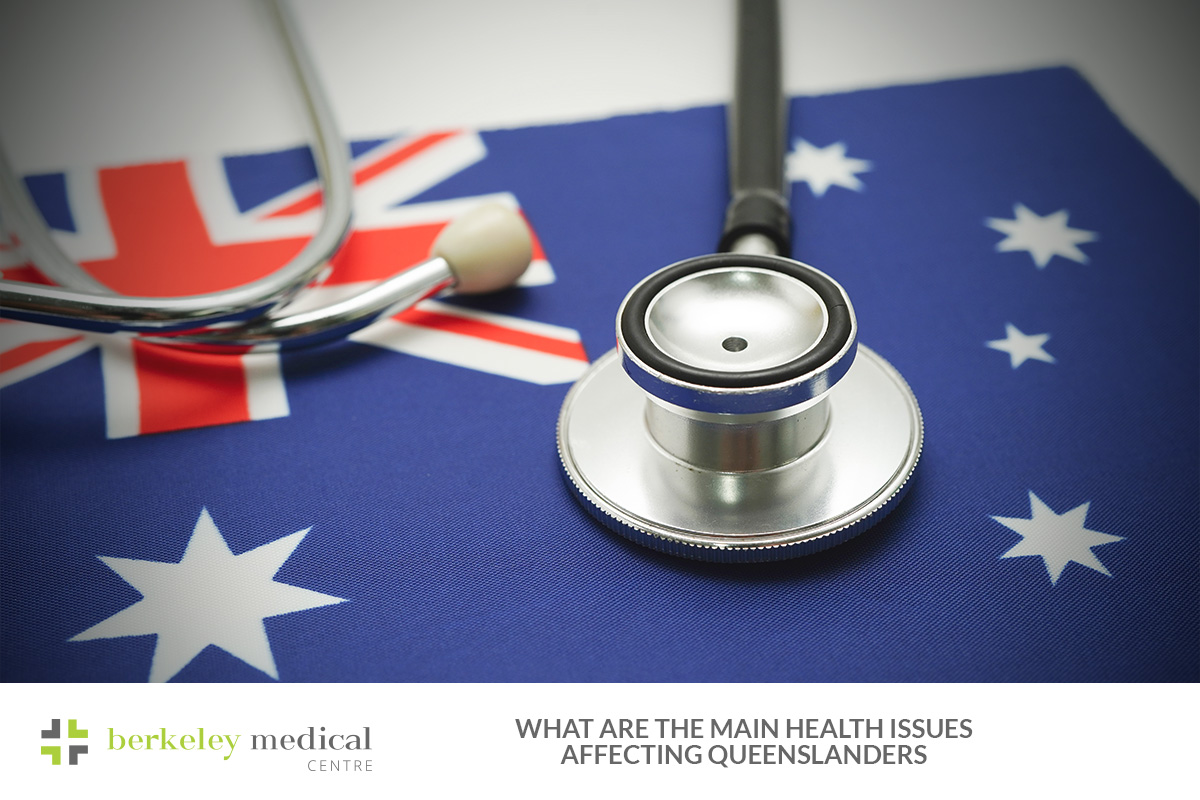In 2025, health issues Queenslanders are facing continue to grow from chronic conditions and mental health challenges to lifestyle-related diseases and vaccine-preventable illnesses. As the population increases and ages, it is more important than ever to understand what’s impacting our health and how to take action.
This guide highlights the data from Queensland Health, exploring the most common health issues affecting Queenslanders today. You will also discover how early intervention, regular GP visits and preventative care can help reduce risk and support long-term wellbeing.
What This Article Covers
- The top 6 health problems in Queensland (2025)
- Lifestyle and environmental risk factors
- Early warning signs to watch for
- How general practitioners support prevention and chronic care
- Why Queenslanders need regular health check-ups
Chronic Diseases Are Widespread in Queensland
Chronic diseases remain one of the most serious health issues in Queensland. Conditions such as:
- Type 2 diabetes
- Heart disease and high blood pressure
- Chronic respiratory illnesses like asthma and COPD
are responsible for most hospital admissions, healthcare costs and avoidable deaths.
Early intervention is critical. GPs across Queensland regularly provide chronic disease management plans, blood pressure checks, diabetes screening and support for medication and lifestyle changes. By managing these conditions early, patients can avoid complications like stroke, kidney damage and loss of mobility.
Mental Health Issues Are Rising Across All Age Groups
Mental health in Queensland continues to decline, particularly among young adults, carers and people in regional areas. Conditions such as:
- Anxiety
- Depression
- Post-traumatic stress disorder (PTSD)
- Chronic stress
are now among the top reasons people visit their GP.
Mental health plans, referrals to psychologists and ongoing support from GPs make a real difference. Early access to mental health services helps reduce long-term effects and improves day-to-day functioning especially when combined with lifestyle changes and emotional support.
Cancer Rates Remain High, Especially Skin Cancer in Queensland
Queensland has one of the highest skin cancer rates in the world, due to high UV exposure and our outdoor lifestyle. Other common cancers affecting Queenslanders include:
- Breast cancer
- Bowel cancer
- Prostate cancer
- Lung cancer
Regular cancer screening saves lives. Eligible patients are encouraged to take part in national screening programs, while GPs play a key role in conducting skin checks and referring patients for mammograms, colonoscopies and prostate exams.
Detecting cancer early leads to better outcomes and less intensive treatment.
Obesity and Physical Inactivity Are Fueling Health Risks
Obesity is one of the fastest-growing health concerns in Queensland, increasing the risk of:
- Type 2 diabetes
- Cardiovascular disease
- Joint pain and mobility issues
- Sleep disorders like sleep apnoea
GPs provide evidence-based weight management plans, including support from dietitians, exercise physiologists and psychologists. Even small, sustainable changes in physical activity and diet can lead to major health improvements over time.
Alcohol, Smoking and Vaping Continue to Impact Public Health
Substance-related harm remains a serious issue in 2025. Smoking rates have declined, but vaping is on the rise, especially among teenagers and young adults. Additionally, alcohol misuse continues to cause:
- Liver damage
- Mental health decline
- Increased cancer risk
- Accidents and injuries
GPs in Queensland are actively helping patients reduce risky behaviours through counselling, prescription support and links to addiction services. Brief interventions in general practice settings are proven to support long-term change.
Vaccine-Preventable Illnesses Are Still a Threat
Despite strong immunisation programs, vaccine-preventable diseases still pose a risk, particularly for children, seniors and people with chronic health conditions. In 2025, key areas of concern include:
- Influenza
- COVID-19
- Pneumonia
- Shingles
- Measles and whooping cough (in under-immunised communities)
Regular GP check-ups help keep vaccination records up to date and ensure patients receive timely protection. Staying vaccinated is one of the most effective ways to protect individual and public health.
Contributing Risk Factors in Queensland
Several lifestyle and environmental factors are increasing health risks across the state, including:
- High UV exposure
- Sedentary work and limited exercise
- Diets high in sugar, salt and processed foods
- Stress, isolation and financial pressure
- Normalisation of alcohol and vape use
- Underuse of health screening programs
By identifying and addressing these risk factors early, patients and healthcare providers can prevent many health conditions before they become serious.
The Importance of GP-Led Primary Care
General practitioners are at the frontline of healthcare in Queensland. They play a key role in:
- Detecting diseases early
- Coordinating treatment and specialist referrals
- Supporting mental health and chronic conditions
- Providing immunisations and preventative care
- Offering lifestyle advice tailored to the patient’s needs
Whether you are managing an existing condition or aiming to prevent future illness, working closely with your GP can make a major difference in your long-term health.
Conclusion
Queenslanders in 2025 face a range of health issues from chronic disease and mental health to lifestyle-related conditions and cancer. However, most of these health problems are preventable or manageable with the right knowledge, early action and support from healthcare professionals.
Through regular check-ups, cancer screening, mental health care and healthy lifestyle support, general practitioners empower patients to take control of their health and wellbeing.
About Berkeley Medical Centre
Berkeley Medical Centre, located in Kenmore QLD, is committed to helping Queenslanders live healthier lives. Our team of experienced GPs and allied health professionals provides care in chronic disease management, mental health support, cancer screening, immunisations, skin checks and lifestyle coaching.
Whether you are booking your annual health check, looking for help managing diabetes or hypertension or seeking mental health support, we are here to support you with evidence-based, compassionate care.Your health matters take the next step with Berkeley Medical Centre.







